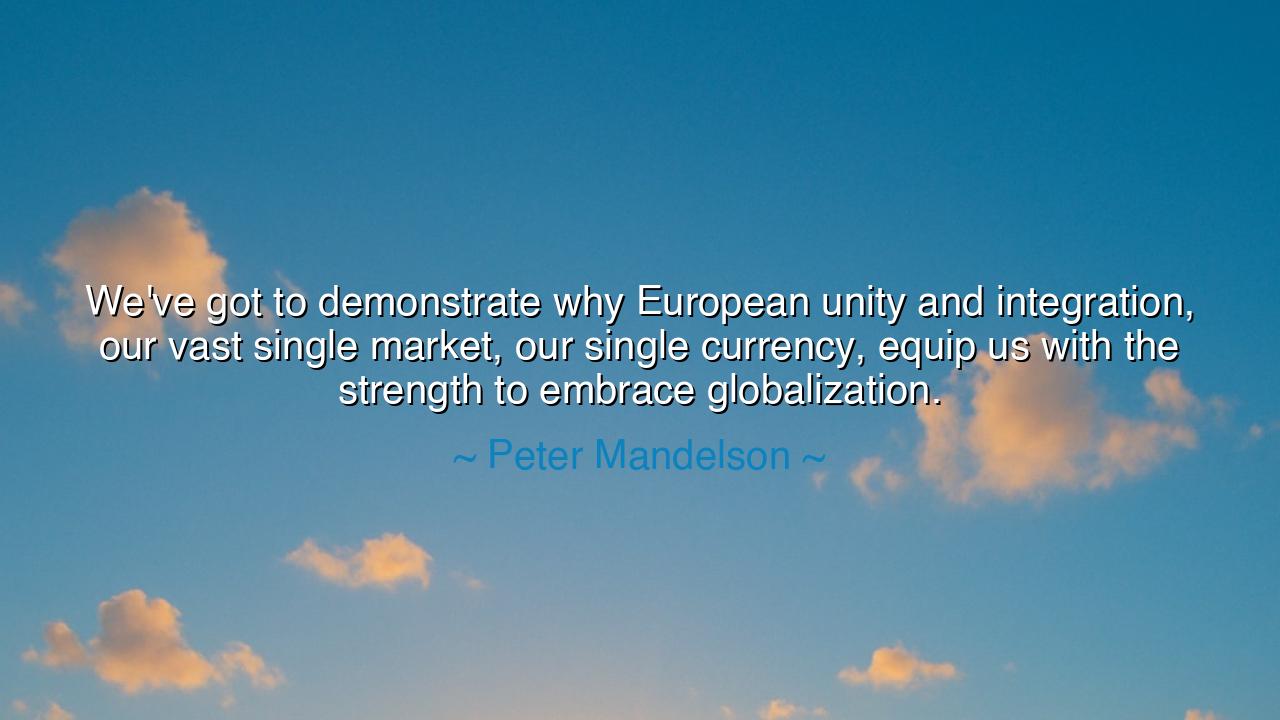
We've got to demonstrate why European unity and integration, our
We've got to demonstrate why European unity and integration, our vast single market, our single currency, equip us with the strength to embrace globalization.






The words of Peter Mandelson resound with the vision of one who sees far beyond the borders of a single land: “We’ve got to demonstrate why European unity and integration, our vast single market, our single currency, equip us with the strength to embrace globalization.” Here, he speaks not merely of trade and politics, but of the eternal principle that unity is greater than division, and that a people bound together can endure storms that would shatter them if they stood alone.
To Mandelson, the dream of European unity is not an abstraction, but a shield and a foundation. The single market, vast and interwoven, allows nations once torn by centuries of war to labor side by side, turning rivalry into partnership. The single currency, the euro, is more than coin and paper—it is a symbol that these nations, with their diverse tongues and histories, can walk together on a common road. Such integration is not weakness, but strength—the strength to meet the ever-changing tides of globalization without fear.
History itself testifies to this truth. In the aftermath of the Second World War, Europe was broken, impoverished, and divided. Yet out of those ashes arose the vision of the European Union, a union not forged by conquest but by cooperation. Nations that once clashed with sword and fire now chose to share coal, steel, and trade. From this beginning grew a vast market and eventually a common currency, showing that where once there had been ruin, there could now be prosperity. This was the living proof of Mandelson’s words: unity equips us to face the world.
Consider also the fate of those who refused unity. History tells us of the Greek city-states, brilliant yet divided. When they stood together, as at Marathon, they repelled even the mighty Persians. But when they fell into jealousy and rivalry, they weakened themselves, and mighty Macedonia rose to dominate them. Their story is a warning for every age: division leaves a people vulnerable; integration multiplies their power. Mandelson’s call for European cooperation is thus not new, but echoes the lessons of antiquity.
The deeper meaning of his words is this: globalization is not a storm to resist, but a sea to be navigated. Alone, a small ship may sink; together, a fleet can cross the oceans. By sharing markets, resources, and currency, Europe becomes a vessel vast and steady enough to withstand the winds of change. This is not merely about economics, but about survival in an interconnected world where strength lies not in isolation, but in unity.
The lesson for us is clear: whether in nations, communities, or even families, strength is born of cooperation, not rivalry. If we cling only to our small divisions, we may protect our pride, but we will lose our future. But if we bind ourselves together, sacrifice a little independence for the sake of common strength, we can face any challenge. Unity is not the loss of self, but the magnifying of self through shared purpose.
Practical action lies before us all. Nations must continue to build bridges, not walls. Communities must learn to see differences not as barriers, but as opportunities for shared growth. Individuals, too, must practice unity in daily life—choosing collaboration over competition, choosing integration over isolation. For the world is now one vast marketplace, one great web of destinies, and only those who stand together will thrive within it.
So let Mandelson’s words endure as counsel for the generations: European unity, the single market, the single currency, are not mere tools of commerce, but symbols of what mankind can achieve when it chooses integration over division. With them comes the strength to embrace the world as it changes, not with fear, but with readiness. And this lesson is not only for Europe, but for all peoples: the future belongs to those who walk together.






AAdministratorAdministrator
Welcome, honored guests. Please leave a comment, we will respond soon